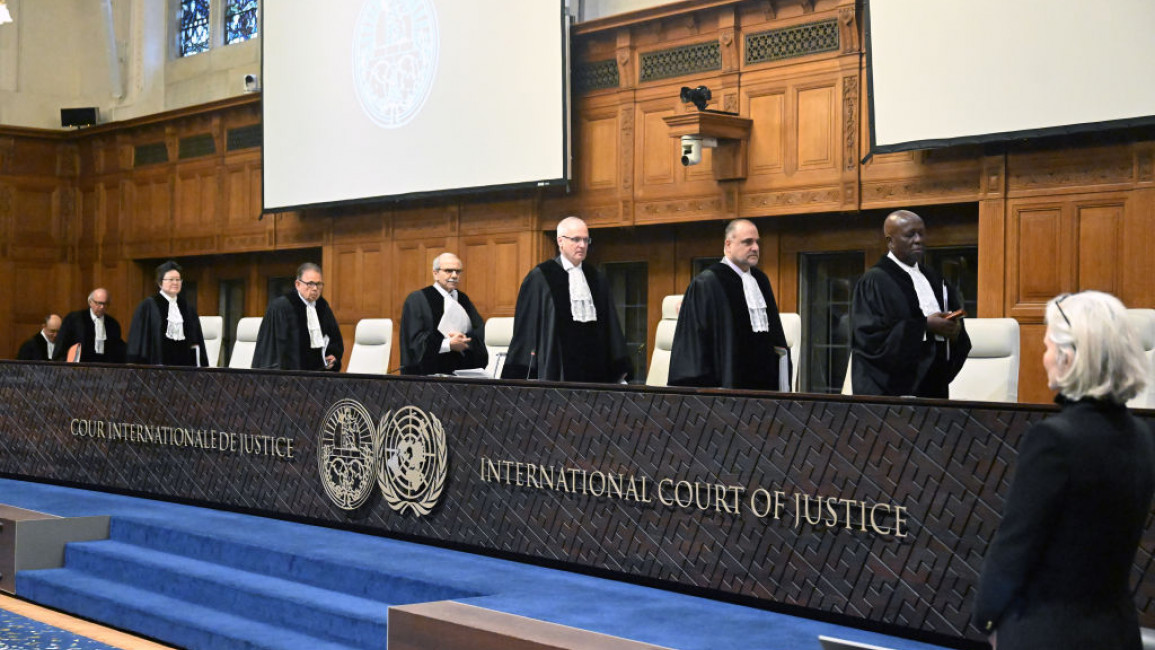Meet the MENA judges presiding over South Africa's ICJ genocide case against Israel
There are three judges from across regions among the 15-member panel currently examining South Africa's genocide case brought against Israel's war in Gaza in the International Court of Justice (ICJ), and people from their countries are asking them to be on the right side of history.
Judge Mohammed Bennouna is Moroccan 🇲🇦 , and a member of the International Court of Justice. I hope he will be on the right side of History. #JusticeForGaza pic.twitter.com/k16PBSdHbW
— Omar H. 🇲🇦 🇵🇸 (@Omar_H_) January 11, 2024
Morocco: Mohammed Bennouna
Born in 1943 in Marrakech, Dr Mohamed Bennouna studied jurisprudence and political science at the universities of Nancy and Paris, where he got his Ph.D. in international law. He is also a graduate of the Hague Academy of International Law.
Before his journey to the Hague, Dr Bennouna was a professor and dean of the Faculty of Legal and Economic Sciences in Rabat from 1972 to 1984.
Then, he served as Deputy Permanent Representative to the United Nations and later as Ambassador and Permanent Representative of Morocco from 2001 to 2005.
He was first elected as a judge at the ICJ in February 2006 and was re-elected in 2015 for another nine-year term.
As Morocco’s representative in the UN, Dr Benouna condemned in 2002 Israel’s besiegement of Palestinian President Yasser Arafat and Tel Aviv’s aggressions against the Palestinian people. He asked the UN to take responsibility at the time.
Lebanon: Nawaf Salam
In 2017, Dr.Nawaf Salam, 70, a Lebanese diplomat, jurist, and academic, became the second Lebanese to be elected to the ICJ since its establishment.
He went to Science Po, Harvard Law School and Sorbonne in Paris, where he received his Ph.D. in international law.
His diplomatic career as Lebanon’s Ambassador to the United Nations was marked by his advocacy for Palestinian rights, efforts towards stability in South Lebanon, and urging a resolution to the Syrian conflict.
Dr. Salam has authored several publications on political and constitutional reform and electoral law reform.
One of the judges is Lebanese.🇱🇧
— 🌿 (@CuriousM_) January 11, 2024
Judge Nawaf Salam @nawafasalam, we trust you! https://t.co/Zd7DUtzX9l
Somalia: Abdulqawi Ahmed Yusuf
Dr.Abdulqawi Ahmed Yusuf, 75, is a Somali judge and former President of ICJ.
He holds a Ph.D. in Political Science and International Law from the University of Geneva and a Ph.D. degree with honours in law from the University of Paris I.
Elected for the first time as a court member in 2009, he was re-elected in 2018.
He served as the Deputy President of the Court between 2015 and 2018 and as the President of the Court from 2018 until 2021.
He is also the founder and president of the African Institute of International Law.
In 2020, as President of ICJ, he imposed provisional measures on Myanmar, requiring the junta to direct its forces not to commit genocide and to preserve all relevant evidence. The case was brought by the Gambia. It marked the first time a state not directly involved or harmed by an occurring war took another involved state to the ICJ.
His rule against Myanmar marked one of the rearrest times ICJ handled genocide issues. It also paved the way for South Africa's genocide case against Israel, according to the Global Centre for the Responsibility to Protect.


![President Pezeshkian has denounced Israel's attacks on Lebanon [Getty]](/sites/default/files/styles/image_684x385/public/2173482924.jpeg?h=a5f2f23a&itok=q3evVtko)



 Follow the Middle East's top stories in English at The New Arab on Google News
Follow the Middle East's top stories in English at The New Arab on Google News


